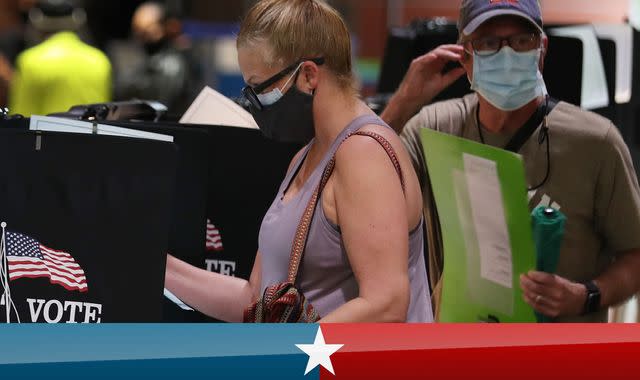US election 2020: Russia and Iran have obtained voter information ahead of US election, security officials say

In 2016 Russia tried to influence the US presidential election, this year it's Iran, according to US security officials.
Emails from a far-right group linked to Donald Trump threatening to "come after" US voters if they don't vote for him, are actually from Iran, the FBI has said.
The emails, purportedly from the Proud Boys, were sent to registered Democratic voters in at least four battleground states including Florida and Pennsylvania.
John Ratcliffe, the US national intelligence director, called them "desperate attempts by desperate adversaries".
"We have confirmed that some voter registration information has been obtained by Iran, and separately, by Russia.
"We have already seen Iran sending spoofed emails designed to intimidate voters, incite social unrest and damage president Trump."
The emails are under investigation, and one intelligence source said it was still unclear who was behind them, according to Reuters.
:: Subscribe to Divided States on Apple podcasts, Google Podcasts, Spotify, and Spreaker
Another government source said that US officials are investigating whether people in Iran had hacked into a Proud Boys network or website.
This source said US officials suspect the Iranian government was involved but that the evidence is inconclusive.
FBI director Christopher Wray added: "You should be confident that your vote counts. Early, unverified claims to the contrary should be viewed with a healthy dose of scepticism."
Tehran also distributed a video that falsely suggested voters could cast fraudulent ballots from overseas, Mr Ratcliffe said.
At a news conference on Wednesday, the pair said Washington would impose costs on foreign countries that interfere in the election.
Early voting has already begun in some US states ahead of the main polling day, a week on Tuesday.
The voter intimidation operation apparently used email addresses obtained from state voter registration lists, which include party affiliation and home addresses and can include email addresses and phone numbers.
Those addresses were then used in an apparently widespread targeted spamming operation.
Though Democratic voters were targeted, Mr Ratcliffe said the spoofed emails were intended to harm Mr Trump in his battle with Democrat challenger Joe Biden, though he did not explain how.
One possibility is the messages may have been intended simply to link the president with the Proud Boys, a far-right group, in the minds of voters.
Mr Trump was widely criticised for failing to unequivocally denounce the group, which has been linked to violence, during the first presidential debate.
The allegations illustrate the US government's determination to ensure foreign countries are not allowed to influence this year's ballot, after what happened four years ago.
Moscow carried out a covert social media campaign in 2016 aimed at sowing unrest and was behind leaked hacked emails that damaged Mr Trump's opponent, Hillary Clinton.
A lengthy investigation by special counsel Robert Mueller into alleged collusion between the Trump campaign and Moscow followed, the whole episode dismissed as "the Russia hoax" by Mr Trump.
Alireza Miryousefi, a spokesman for Iran's mission to the United Nations, denied Tehran's involvement.
"Unlike the US, Iran does not interfere in other country's elections," Mr Miryousefi wrote on Twitter.
Mr Trump, speaking at a rally in North Carolina, made no reference to the intelligence announcement, but repeated a familiar campaign assertion that Iran is opposed to his re-election.

 Yahoo News
Yahoo News 
